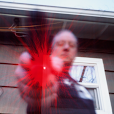Consider the noble astronaut.
In the NASA space program, astronauts are selected from the ranks of extremely capable, intelligent, and disciplined professionals. In the early days of space pioneering, the hiring pool was primarily military, primarily pilots, primarily the best of the best. John Glenn, for instance, a decorated Marine pilot, was the first American to orbit the Earth, and returned to space at age 77 on the space shuttle, Discovery. In between his bookend space voyages, he managed to fill his time as an Ohio senator from 1974 - 1999. Neil Armstrong, the first human to walk on the Moon, was a test pilot, who flew the X-15 rocket plane to the very edge of the atmosphere, at an amazing Mach 5.74 (3,989 MPH). The X-15 proved to be a farm league for aspiring spacefarers. These men were undeniably the best of the best. Of. The. Best.
Today, in an age of almost-routine space flights, and after thirty years of shuttle missions, the pedigree of astronauts has blossomed to include geologists, climatologists, meteorologists (pick your favorite Ologist), teachers, researchers, and, as mentioned, a retired astronaut-senator. The shift from get-it-done, proof-of-concept space flight to nuts-and-bolts space science demanded a wide variety of educational credentials, in addition to the ability to function in a dangerous environment, under stressful conditions, and the ability to improvise and make critical decisions. Make no mistake - contemporary astronauts are still highly-trained primates in a rocket, but now they need to do more than just push the right button, at the right time, and not freak out. They have extra-primate gifts, talents, and training that benefit the goals of NASA, and, ultimately, all of the other primates down here on this globe, plus the other animals and plants that share this cosmic oasis.
While there is considerable status in being an astronaut, everyone understands that the mission is the priority. Decisions about safety, weather, or equipment trump the personal aspirations of individuals in the program, and it's expected that if something goes awry, the launch may be delayed or scrubbed. For someone who has devoted a considerable amount of their life to the barest chance of space travel, I can only imagine that such an occurrence is a crushing disappointment. But the mission dwarfs the tiny (yet highly-qualified) monkeys that strap themselves into the seats of an immense and exquisitely exotic vehicle that roars skyward on a plume of fire, only to glide home when the work is done.
The Driver and I have heard that there is a storm coming. There is no doubt that it will pass very close to the our launch pad, but we continue preparing ourselves, hoping that our launch will not be aborted. We chat about the consequences of a delay in our launch window, hopeful that this is wasted conversation. The storm will certainly impact our command base, but it is unknown whether the mission will continue, or if it will necessarily be affected. We do not know.
We're buckled in, ready, skeptical, hopeful. The countdown continues.
Sunday, July 24, 2011
Subscribe to:
Post Comments (Atom)


No comments:
Post a Comment